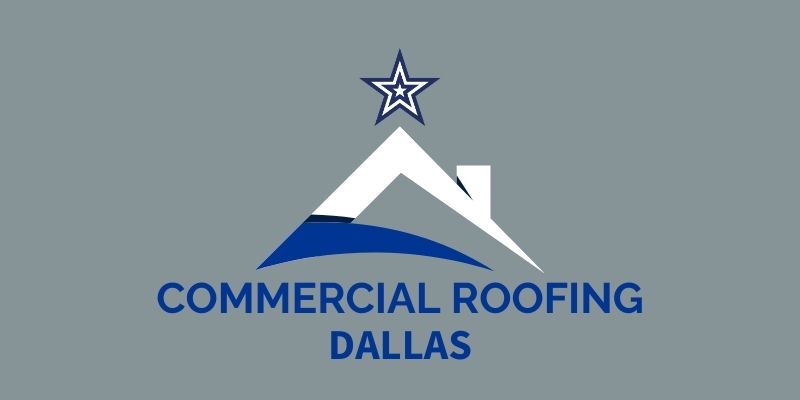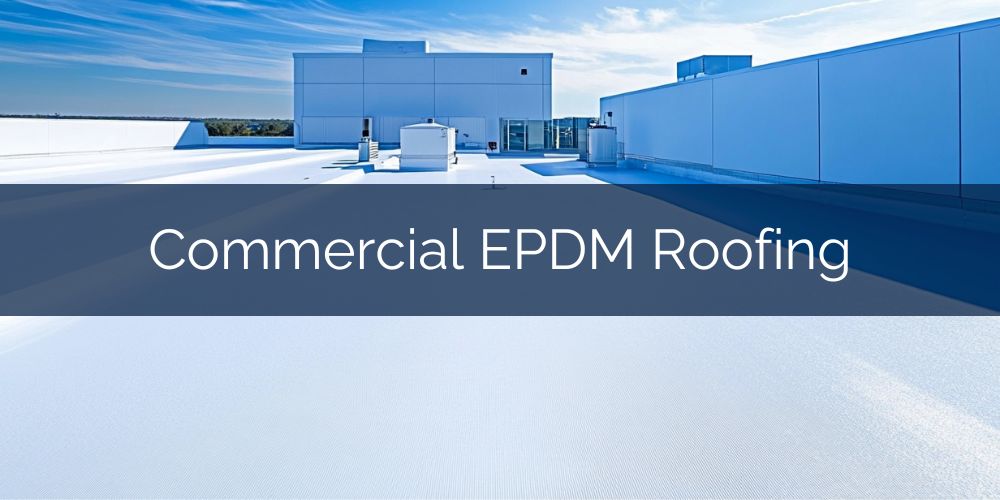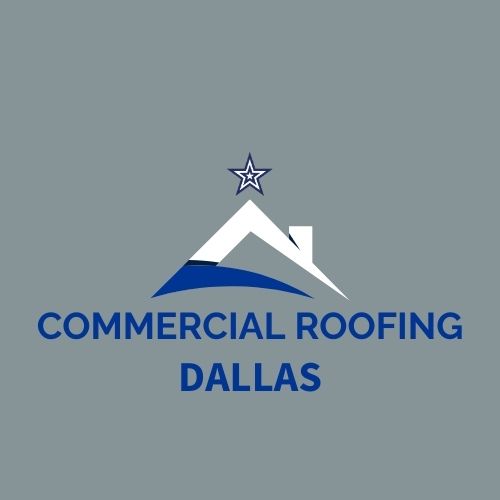Commercial EPDM roofing involves the installation, maintenance, and repair of EPDM (ethylene propylene diene terpolymer) rubber roofing systems on commercial properties. These roofing solutions are typically applied to flat or low-slope roofs found on office buildings, warehouses, and industrial facilities. EPDM material is favored for its durability, weather resistance, and longevity, capable of withstanding extreme weather conditions, UV exposure, and thermal fluctuations. It provides an energy-efficient and cost-effective solution for protecting commercial buildings. Commercial Roofing Dallas deliver expert commercial EPDM roofing services across the Dallas, Texas area.
What Is Commercial EPDM Roofing?
Commercial EPDM roofing, or Ethylene Propylene Diene Monomer roofing, is a durable rubber roofing membrane commonly used on low-slope commercial buildings. Known for its excellent resistance to weather conditions, ozone, and UV radiation, EPDM is available in both black and white colors. The black version absorbs heat, which can help reduce heating costs, whereas the white version reflects sunlight, offering an energy-efficient solution in warmer climates. Installation is versatile, with options like ballasted, fully adhered, or mechanically attached methods that suit varied structural needs. Its flexibility and lightweight nature simplify installation and maintenance compared to other roofing types. Additionally, EPDM's lifespan can exceed 30 years, highlighting its cost-effectiveness and long-term value for commercial properties.
In Dallas, Texas, commercial EPDM roofing is particularly beneficial due to its ability to withstand the high temperature fluctuations and humidity levels typical of the area. The choice of installation method, such as fully adhered systems, is crucial to accommodate the unique climate challenges and local building codes in Dallas, ensuring both durability and compliance.
Have a question about an upcoming project?
How Does EPDM Roofing Perform In Dallas's Climate?
EPDM roofing performs well in Dallas's hot and variable climate. Its durability and weather resistance make it suitable for the region's temperature fluctuations and occasional storms. However, additional consideration of its UV reflectivity and heat absorption is important to maximize its performance in Dallas's intense sun exposure.
- UV Resistance: Provides significant protection against Dallas's intense sunlight and UV exposure.
- Durability: Withstands the region’s temperature fluctuations and occasional severe weather conditions.
- Weather Resistance: Effectively combats Dallas's sporadic rainstorms and high wind speeds.
- Energy Efficiency: Dark surfaces absorb heat without added reflective coatings, impacting cooling costs.
- Low Maintenance: Minimal upkeep required, suitable for Dallas's varying seasonal conditions.
1. UV Resistance: Provides significant protection against Dallas's intense sunlight and UV exposure.
UV resistance refers to a roofing material's capability to withstand and protect against ultraviolet radiation, preventing deterioration and extending the lifespan of commercial roofs in sunny environments like Dallas. The consistent and powerful sunlight in Dallas, known for its high UV index, puts roofing materials under persistent stress, which UV-resistant solutions are designed to mitigate. EPDM roofing, with its inherent UV resistance, demonstrates excellent performance by maintaining its structural integrity and preventing rapid material degradation in such intense sunlight conditions. Implementing UV-resistant roofing materials can significantly enhance the durability and efficiency of commercial roofs, making them particularly suited for Dallas's sunny climate. Regular maintenance and inspections further ensure that the UV protection remains effective over time, allowing businesses to avoid premature repair costs. Additionally, UV resistance contributes to energy savings by reducing heat absorption, which is critical for managing cooling costs in large commercial buildings in Dallas.
2. Durability: Withstands the region’s temperature fluctuations and occasional severe weather conditions.
Durability in commercial roofing refers to the ability of a roof to maintain its functional and structural integrity despite exposure to varying temperatures and extreme weather conditions. EPDM roofing is highly resistant to Dallas's climate because it can endure extreme heat and sudden cold snaps without losing its effectiveness. This resilience ensures that the roof can handle the frequent temperature swings and occasional severe storms typical of the region, preserving its performance over time. Maintaining durability in such climates involves selecting roofing materials that can flex and contract without cracking under thermal stress. Regular maintenance checks are crucial for detecting any potential wear brought on by severe weather, helping to prolong the roof's life. By choosing a durable commercial roofing system like EPDM, building owners in Dallas can ensure long-term protection and reduced repair costs.
3. Weather Resistance: Effectively combats Dallas's sporadic rainstorms and high wind speeds
Weather resistance refers to a roofing system's ability to withstand adverse weather conditions, such as rainstorms and high winds, without sustaining damage or losing functionality. EPDM roofing excels in Dallas's climate due to its outstanding weather resistance, making it capable of handling sporadic rainstorms without compromising on leak protection. The inherent flexibility of EPDM allows it to perform well even under the high wind conditions often experienced in Dallas, maintaining its adherence and structural integrity. This durability under such weather conditions ensures the longevity and reliability of commercial roofing systems, which is crucial for business continuity. Regular maintenance and inspections enhance this performance by addressing any minor issues before they can escalate. Choosing EPDM roofing for its weather-resistant properties can significantly reduce repair costs and provide long-term peace of mind for commercial building owners.
4. Energy Efficiency: Dark surfaces absorb heat without added reflective coatings, impacting cooling costs
Dark roofing surfaces that lack reflective coatings absorb more heat, increasing cooling costs for commercial buildings. EPDM roofing, commonly a dark membrane, can be less energy-efficient in hot climates like Dallas due to its tendency to absorb heat. This absorption increases the cooling load on a building, thereby elevating energy costs, especially during the summer months. EPDM roofs can be modified with reflective coatings or white EPDM options to improve energy efficiency by reducing heat absorption. This adjustment can significantly lower cooling energy usage, contributing to reduced operational costs. Using energy-efficient roofing materials helps businesses achieve sustainability objectives and mitigate their environmental impact in urban settings.
5. Low Maintenance: Minimal upkeep required, suitable for Dallas's varying seasonal conditions.
Low maintenance implies that commercial roofing materials are designed to withstand the regional climate with minimal need for repairs or frequent servicing. Dallas's climate, characterized by hot summers and occasional severe weather, demands roofing solutions like EPDM that are resilient and require minimal maintenance. These roofs are durable and can handle temperature fluctuations and precipitation without frequent intervention, ensuring reliable performance. By choosing low-maintenance commercial roofing systems, businesses in Dallas can reduce long-term operational costs. The reduced need for constant repairs or replacements protects the building investment, minimizes disruptions, and contributes to cost efficiency. Ensuring the correct installation and conducting periodic checks can maintain the roofing system’s performance and longevity over the years.
What Are The Costs Of Installing EPDM In Dallas?
Installing EPDM roofing in Dallas typically ranges from $4 to $10 per square foot. The cost can vary based on factors such as the quality of materials, the complexity of the roof design, and the contractor's expertise. Additional expenses may include labor, permits, and the size of the roof, all of which contribute to the final cost.
- Material Quality: Higher-quality EPDM results in longer-lasting and more expensive installations.
- Roof Complexity: Intricate designs increase labor time and materials needed.
- Contractor Expertise: Highly skilled contractors may charge higher fees for installation.
- Roof Size: Larger roofs require more materials and labor, impacting overall cost.
- Additional Expenses: Permits and additional reinforcements can add to the installation cost.
1. Material Quality: Higher-quality EPDM results in longer-lasting and more expensive installations
Material quality refers to the characteristics and durability of EPDM roofing materials which contribute to their longevity and cost. High-quality EPDM offers increased resistance to weathering and physical damage, which is crucial when considering the costs of installing EPDM in Dallas’s varied climate. The material's durability means that installations will require less frequent repairs and replacements, potentially offsetting the higher initial costs with long-term savings. Investing in superior EPDM can lead to enhanced performance and reliability, making it a worthy consideration for commercial roofing projects. Furthermore, higher-quality EPDM often involves advanced manufacturing processes and materials, which contribute to its enhanced performance characteristics. Property owners can benefit from reduced HVAC expenses due to EPDM's insulation properties, which are especially beneficial in regions with extreme temperatures. Regular maintenance and inspections further optimize the roof's life span, ensuring that the initial investment in top-tier materials pays off over time.
2. Roof Complexity: Intricate designs increase labor time and materials needed
Roof complexity refers to the level of intricacy in a commercial roofing design, which typically leads to increased labor time and additional materials required for installation. In Dallas, installing EPDM roofing on complex roof designs can significantly impact the overall cost due to the increased labor and materials needed. Complex roof layouts demand meticulous planning and skill, which contribute to higher installation expenses compared to simpler roof designs. Choosing EPDM for a complicated roof structure may require additional seam sealing and custom-cut materials to ensure proper waterproofing. Strategically, businesses opting for complex designs should work closely with experienced contractors to optimize costs without compromising quality. Regular maintenance and inspections are particularly crucial for intricate roof designs to prevent potential water leakage and other issues that can arise from design-induced stress points.
3. Contractor Expertise: Highly skilled contractors may charge higher fees for installation
Contractor expertise refers to the skill level and experience of professionals conducting the installation of commercial roofing systems, which can influence pricing based on their proficiency and quality of work. When considering the costs of installing EPDM roofing in Dallas, it's important to account for the varying fees that highly skilled contractors charge. Their expertise ensures that the installation is performed correctly and efficiently, which can prevent costly repairs and potential roof failures in the future. Skilled contractors bring years of experience and a deep understanding of the complexities associated with commercial roofing systems like EPDM. Their in-depth knowledge allows them to tackle challenges and unforeseen issues during installation, guaranteeing that the roofing system performs optimally. Investing in a highly skilled contractor could lead to longer-lasting results and ultimately save money through reduced maintenance and repair needs.
4. Roof Size: Larger roofs require more materials and labor, impacting overall cost.
The size of a commercial roof significantly affects its overall installation cost because larger roofs necessitate more resources, including materials and labor. Larger commercial roofs typically require a greater quantity of EPDM material, which directly increases the cost of installation in a place like Dallas where large commercial spaces are common. Additionally, the labor involved increases proportionally with roof size, further adding to the expenses associated with installing EPDM. In commercial roofing projects, obtaining accurate measurements and estimates for large roofs is critical to effectively manage cost expectations and budget planning. Professional roofing contractors can provide a detailed analysis of material and labor requirements specific to the roof size. This information allows for better financial planning and ensures that resources are appropriately allocated to optimize project efficiency and minimize unforeseen expenses.
5. Additional Expenses: Permits and additional reinforcements can add to the installation cost.
Additional expenses are the costs related to necessary permissions and structural enhancements required for the correct installation of a commercial roofing system. When considering the costs of installing EPDM roofing in Dallas, it's important to factor in not only the base material and labor costs but also these additional expenses. Permits ensure the installation complies with local building codes, while reinforcements maintain the commercial building's structural integrity. Failing to account for these additional expenses can lead to budgetary shortfalls or compliance issues later in the project. Integrating these costs into the initial budget planning helps avoid surprises and ensures the project remains on schedule and within regulatory requirements. Building owners can work with roofing contractors to accurately estimate these expenses by considering the specific building code requirements in the Dallas area.
Are There Common EPDM Roof Issues In Dallas?
Yes, EPDM roofs in Dallas can encounter issues primarily due to weather conditions and installation quality. Dallas weather, characterized by intense sun and occasional hailstorms, can affect the performance of EPDM roofs. Proper installation and maintenance are crucial to prevent issues like leaks and punctures.
- Weather Resistance: Vulnerable to Dallas’ intense sunlight and occasional hailstorms.
- Installation Quality: Poor installation may lead to seam separation and water infiltration.
- Thermal Expansion: Dallas heat causes material expansion, leading to stress and potential damage.
- Puncture Risk: Susceptible to physical damage from debris and foot traffic.
- Drainage Issues: Improper drainage can cause water pooling and roof leaks.
1. Weather Resistance: Vulnerable to Dallas’ intense sunlight and occasional hailstorms.
Weather resistance refers to a roofing material's ability to withstand damage from environmental elements such as intense sunlight and hailstorms, common in Dallas. Extreme weather conditions in Dallas, particularly high UV exposure and hail, pose challenges for EPDM roofing systems, leading to premature aging and damage. EPDM roofs, though known for their durability, may suffer from UV radiation, causing them to degrade faster in this climate. Implementing protective coatings and performing regular inspections can help uphold the integrity of EPDM roofing in harsh sunlight or during hailstorms. Additionally, using impact-resistant materials and designs can further mitigate hail damage risks. Property owners must be proactive in maintaining and reinforcing their roofing systems to ensure longevity and performance under Dallas' challenging weather conditions.
2. Installation Quality: Poor installation may lead to seam separation and water infiltration
Poor installation in commercial roofing refers to the inadequate execution of materials and techniques, which can result in issues like seams coming apart and unwanted moisture entering the building. Seam separation and water infiltration are common issues in commercial roofing, including EPDM systems, particularly in areas like Dallas where weather conditions can exacerbate these problems. Improper installation methods not only compromise the roof's immediate performance but also accelerate deterioration due to the area's significant temperature fluctuations and occasional heavy rainfall. Addressing installation quality is vital for ensuring long-term durability and performance of commercial roofs in this environment. By focusing on skilled workmanship and proper installation techniques, commercial property owners can significantly reduce the risk of seam failures and leaks, maintaining the roof's integrity and increasing its lifespan. Regular inspections, particularly after installation, help detect any errors early, allowing for corrective actions before they lead to major issues. Ensuring that roofing contractors are experienced and certified can further prevent installation-related problems, protecting the building from potential water damage and associated repair costs.
3. Thermal Expansion: Dallas heat causes material expansion, leading to stress and potential damage
Thermal expansion refers to the increase in size of roofing materials due to high temperatures, which can result in stress and potential damage to a roof’s structural integrity. Thermal expansion is a critical issue for EPDM roofing systems in Dallas because these systems are vulnerable to the city’s intense heat. The expansion and contraction of EPDM membranes due to temperature fluctuations can lead to stress-related problems like membrane splitting and seal failures. Such issues compromise the roof's durability and its ability to provide consistent weatherproofing. To mitigate the effects of thermal expansion, it is advisable to incorporate expansion joints into the roofing system design to accommodate movement. Regular inspections are essential to identify signs of wear from thermal stress and to ensure timely repairs before minor issues become more severe. Implementing a preventative maintenance program will help extend the lifespan of EPDM roofs in Dallas's challenging climate.
4. Puncture Risk: Susceptible to physical damage from debris and foot traffic
The risk of punctures involves the vulnerability of roofing materials to be pierced or damaged through contact with sharp objects or by sustained foot traffic. Puncture risk is an important consideration for EPDM roofs in Dallas due to the high potential for damage from debris carried by strong winds and heavy usage in commercial settings. Such physical impacts can compromise the roof's waterproofing ability, leading to leaks and further structural issues. Implementing protective strategies, such as walkway pads or additional layers in heavily trafficked areas, can help mitigate the risk of punctures. Regular inspections and maintenance are crucial in identifying and repairing punctures early before they lead to more significant damage. By taking proactive measures, building owners can extend the lifespan of their EPDM roofing systems and maintain their performance in challenging environmental conditions.
5. Drainage Issues: Improper drainage can cause water pooling and roof leaks
Drainage issues on commercial roofs occur when water is not effectively redirected away, leading to pooling that can eventually result in leaks and structural damage. In Dallas, where extreme weather conditions and sporadic heavy rainfalls are common, EPDM roofs face challenges related to drainage issues. Prolonged water pooling on the flat surfaces of commercial roofs can exacerbate the risk of leaks, undermining the durability and waterproofing capabilities of EPDM systems. Addressing these drainage problems promptly is essential to maintaining the roof's integrity and longevity. Regular inspection and maintenance are crucial to identify blockages or damage around drainage systems and to ensure that water flow is unobstructed. Implementing adequate sloping or taper systems can be an effective solution for promoting efficient drainage, especially under heavy rainfall conditions. By investing in a comprehensive drainage management plan, building owners can prevent costly repairs and extend the lifespan of their commercial roofing.


